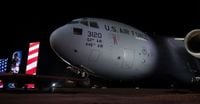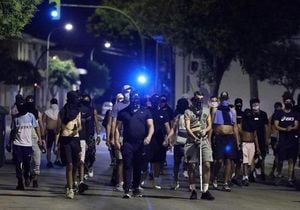On Monday, June 23, 2025, tensions in the Middle East escalated sharply as Iran launched a missile attack targeting the Al Udeid Air Base in Qatar, a major U.S. military outpost. This strike was a direct retaliation for the American bombing of Iranian nuclear facilities over the weekend, marking a significant intensification in the ongoing conflict between the United States, Israel, and Iran.
According to multiple sources, including U.S. defense officials and Qatar's Foreign Ministry, the missile barrage consisted of short-range and medium-range ballistic missiles. Fortunately, Qatar's air defenses successfully intercepted these missiles before they could strike the base, preventing any casualties or significant damage. President Donald Trump confirmed there were no U.S. casualties and described the missile attack as a "very weak response." He further expressed gratitude that Iran had given advance warning of the strike, which allowed for precautionary measures, including the evacuation of the base and the lifting of a shelter-in-place order for American personnel in Doha.
Qatar's Foreign Ministry condemned the attack as a "flagrant violation" of its sovereignty, airspace, and international law. Spokesperson Majed Al Ansari emphasized that the base had been evacuated prior to the attack following established security protocols amid regional tensions. Al Ansari also stated that Qatar reserves the right to respond proportionally and in accordance with international law to this aggression.
The missile attack was broadcast on Iranian state television accompanied by martial music, with captions describing it as "a mighty and successful response to America’s aggression." Iranian President Masoud Pezeshkian posted on the social platform X just before the attack, stating, "We neither initiated the war nor seeking it. But we will not leave invasion to the great Iran without answer." This rhetoric suggests that while Iran sought to retaliate, it appeared cautious about further escalation.
The Al Udeid Air Base is a critical strategic facility housing around 10,000 U.S. troops and serving as the Combined Air Operations Center, which commands air power across the region. The base's significance means any attack on it carries substantial geopolitical weight. Reports also emerged of missiles launched toward the Ain al-Assad base in western Iraq, another U.S. military installation, though these missiles reportedly did not reach their target.
These developments followed a dramatic U.S. military operation on Sunday, June 22, 2025, when B-2 stealth bombers struck three Iranian nuclear sites, including the Fordo uranium enrichment plant. The strikes involved bunker-buster bombs and were intended to cripple Tehran's nuclear program. Rafael Grossi, head of the International Atomic Energy Agency, indicated that the Fordo facility likely suffered "very significant" damage, though the full extent remains unclear. Iran condemned the U.S. strikes as crossing "a very big red line," with officials claiming that nuclear material had been removed from the targeted sites ahead of time.
Meanwhile, Israel expanded its military campaign against Iran, striking symbolic targets in Tehran such as the gate of Evin prison, notorious for holding political prisoners and dual nationals, and the headquarters of the military force that suppressed recent protests. Israeli strikes have killed at least 950 people in Iran, including civilians and security personnel, according to Human Rights Activists. In Israel, the conflict has resulted in at least 24 deaths and over 1,000 injuries.
Israeli Prime Minister Benjamin Netanyahu welcomed U.S. support in the conflict, while the Israeli military warned that attacks on military sites around Tehran would continue in the coming days. However, Israeli officials clarified that their goal is to pressure the Iranian administration rather than to topple the regime.
On the diplomatic front, Russian President Vladimir Putin met with Iranian Foreign Minister Abbas Araghchi in Moscow, denouncing the Israeli and American attacks as "absolutely unprovoked aggression." Russia reaffirmed its strategic partnership with Iran, with Deputy Foreign Minister Sergei Ryabkov calling Iran's right to self-defense "unbreakable." The two leaders discussed ways to steer the regional situation toward a peaceful resolution.
Heightened security concerns extended beyond the Middle East. The U.S. State Department issued advisories urging American citizens in Qatar and worldwide to exercise increased caution. The U.S. embassy in Baghdad ordered additional personnel to leave Iraq amid a warning of potential violence inspired by foreign terrorist organizations. The Department of Homeland Security also issued a threat advisory for the United States due to the elevated risk stemming from the conflict.
Meanwhile, the Strait of Hormuz, a vital artery for global energy supplies, remained open but under an "elevated" threat level. The Joint Maritime Information Centre warned of severe consequences for shipping if Iran follows through on threats to close the strait. Notably, three oil and chemical tankers altered their routes to avoid the area.
On the ground, tensions continued to rise across the region. The Israeli military issued evacuation warnings to Tehran residents, advising them to avoid weapons production centers and military installations. A drone reportedly crashed in Jordan’s capital, Amman, causing material damage. Iranian authorities arrested a European national suspected of spying for Israel, highlighting the deepening espionage and security concerns.
In the international arena, NATO Secretary General Mark Rutte emphasized that Iran must not develop nuclear weapons, urging compliance with the Non-Proliferation Treaty. French Foreign Minister Jean-Noel Barrot condemned Israel’s strike on Evin prison, which endangered French prisoners, calling for an immediate cessation of hostilities to enable negotiations. Italy opposed suspending the EU-Israel Association Agreement over alleged human rights violations in Gaza, reflecting differing European perspectives on the conflict.
Back in Washington, President Trump publicly raised the possibility of regime change in Iran on his social media platform, stating, "If the current Iranian Regime is unable to MAKE IRAN GREAT AGAIN, why wouldn’t there be a Regime change???" White House Press Secretary Karoline Leavitt clarified that the president was "simply raising a question" and remained interested in diplomatic solutions. She further remarked, "If the Iranian regime refuses to come to a peaceful diplomatic solution, which the president is still interested and engaging in, by the way, why shouldn’t the Iranian people take away the power of this incredibly violent regime that has been suppressing them for decades?"
The White House and Department of Defense are closely monitoring the situation, with Joint Chiefs Chair General Dan Caine and Defense Secretary Pete Hegseth actively tracking potential Iranian retaliation from the situation room. President Trump was scheduled to meet with senior national security officials on Monday to discuss ongoing developments.
As the conflict enters its second week, the region remains on edge. While Iran’s missile attack on Al Udeid Air Base did not cause casualties, it underscored the fragile and volatile state of affairs. The interplay of military strikes, diplomatic maneuvers, and international responses has created a complex web that could either spiral into wider conflict or, hopefully, lead to renewed dialogue and de-escalation.





